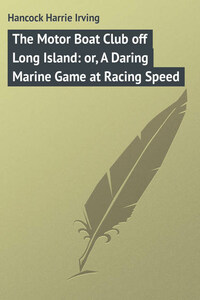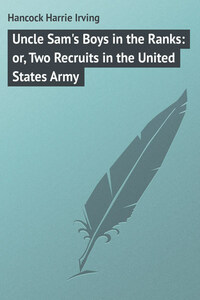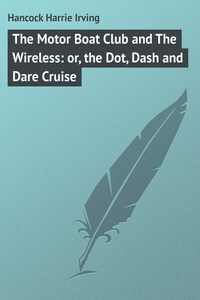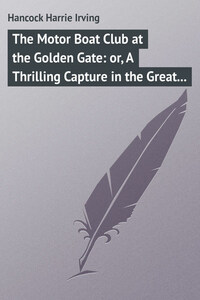CHAPTER I
A BREATHLESS MOMENT IN THE FOG
CLA-A-ANG! Cla-a-ang!
The “Rocket,” a sixty-foot motor cruiser, her engine slowed down to ten miles an hour, had just moved out of comparatively clear water into a thickish bank of fog. The bell, probably on board a sailing craft, had just been heard for the first time off the starboard bow of the cruiser, and close at hand.
Joe Dawson, forward lookout on the “Rocket,” leaned ahead, framing his mouth with his hands as he shouted:
“Ahoy, there! Keep to your own port, captain!”
Cla-a-ang! Cla-a-ang!
The sound of the bell was appallingly nearer, now, seemingly almost upon the motor boat.
Captain Tom Halstead, at the “Rocket’s” wheel, abaft of midship, sounded a shrill warning from his craft’s auto whistle.
Too-oot!
At the same time Halstead threw his own wheel over to go to port of the bell-ringing stranger.
It was a fog that seemed to grow denser with every foot of headway. The water at the hull alongside was barely visible.
Then through the mist ahead shot the tip of a bowsprit. Despite the signals, or through misunderstanding them, the sailing vessel was keeping to her course. She was due either to ram the “Rocket,” or to be rammed by that agile little cruising craft.
There was but one thing to do – to reverse the engine with lightning speed. The engine controls lay convenient to the young skipper’s hand and feet as he stood by the wheel. He was just reaching for the reversing lever, in fact, when, from well aft sounded another boy’s warning:
“Racing craft about to ram your port quarter, captain!”
While, from one of the two men passengers rose an almost despairing shriek:
“I can’t stand this sort of thing. I’d sooner jump overboard!”
Captain Tom, however, without betraying any excitement, sprang so that he could easily glance astern. Instead of the reversing gear, he grabbed for the speed ahead. One glance aft showed him a long, narrow motor craft diving out of the fog. To reverse would mean a collision with the motor boat; to go ahead would mean a smash against the sailing craft. Whatever was to be done had to be thought out at electric speed, all in a second.
Tom’s judgment was for speed ahead. In that sudden emergency he increased the fog speed greatly, at the same time throwing his wheel over as far as it would go.
Thus he escaped a violent meeting with the racing craft, but ranged up alongside of the sailing vessel, a schooner that now appeared dimly, in an almost ghostly light, her rail, soon parallel with the “Rocket’s,” being only a few yards away.
“You lobster smack!” cried Joe, contemptuously. “Why do you ship lubbers for officers?”
The stupid handling that the sailing craft had displayed was enough to rouse anger in the mind of anyone endangered by the gross carelessness.
“Get out, you floating oil-stove!” came back, sullenly, from the sailing craft’s quarter deck. “Your gasoline dories ought to be confined to duck ponds.”
Joe grinned. His wrath was easily dissipated at any time. Anyway, young Captain Halstead, swiftly wearing away to port and again slowing down the speed, put an end to conversation with the stranger.
In this manœuvre the unknown racing motor craft had, of course, been given ample room, and was doubtless well out of reach by this time. But Jed Prentiss, his face still a trifle white, stood on the same spot on the after deck from which he had sounded warning of the swift, narrow boat’s coming.
“Now, Moddridge,” urged a heavy, easy, persuasive voice, “get a grip on yourself and be a man. You see for yourself how easily our new skipper carries himself and the boat in a tight squeeze.”
“But my dear Delavan,” protested the one addressed as Moddridge, “I simply can’t stand this sort of thing. My nerves – ”
“Your nerves have always been the master of a fool slave,” retorted Mr. Delavan, good humoredly. “Come, be born again, and rule your nerves and your wits.”
“That scooter acted like a regular pirate,” uttered Jed Prentiss, under his breath. “Rushing over the old ocean, and never a sound from her whistle or bell!”
Mr. Francis Delavan, owner of the “Rocket,” tall, broad-shouldered, rosy-cheeked and athletic looking despite his fifty years, stepped across the short after deck, going up the short flight of steps at starboard and posting himself on the bridge deck beside Skipper Tom.
“What’s your speed now, captain?” inquired the owner.
“Slowed down to six, sir,” replied young Halstead, punctuating his reply by sounding the auto whistle.
“That’s a wise speed, captain,” nodded the owner. “I haven’t been in as thick a fog as this all season.”
“Are you going to stay here a little while, sir?” queried Tom.
“Why? Anything I can do for you?”
“You might sound the whistle, every thirty seconds, sir, if you will. That will give me a much better chance to pay heed to the lookouts.”
“All right, captain,” laughed the owner, drawing out a handsome watch. “If I make the intervals forty, instead of thirty seconds, put me in irons as soon as you like.”
Captain Tom smiled, but made no other reply. All the young sailing master’s attention was centered on the work in hand. There is nothing at all like play about handling a sixty-foot craft in such a fog. As the incident just closed had shown, there are other lives than those of one’s own sailing party that are at stake in a possible collision in the fog.














